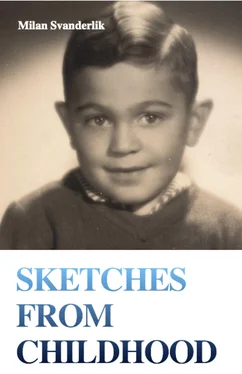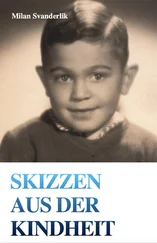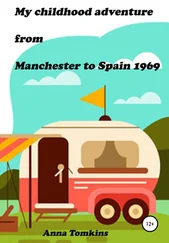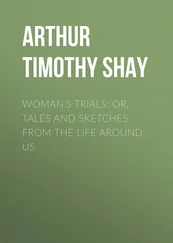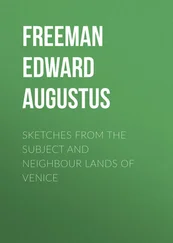Milan Svanderlik
SKETCHES FROM CHILDHOOD
Contents
Title Page Title Page Milan Svanderlik SKETCHES FROM CHILDHOOD
Imprint Imprint SKETCHES FROM CHILDHOOD Copyright © 2021 Milan Svanderlik, London, UK Published by: epubli GmbH, Berlin www.epubli.de Without limiting the rights under copyright reserved above, no part of this publication may be reproduced, stored in or introduced into a retrieval system, or transmitted, in any form or by any means (electronic, mechanical, photocopying, recording or otherwise) without the prior written permission of both the copyright owner and the above publisher of this book. The glamour of childish days is upon me, My manhood is cast down in the flood of remembrance, I weep like a child for the past. from Piano, by D H Lawrence
Prologue Prologue Sketches from Childhood is essentially the memoir of an early childhood that simply happened to coincide with matters of great political moment: Milan Svanderlik was born on the very day that the Communist Party effected a coup d’état in Czechoslovakia, the country of his birth, transforming a struggling, post-war, liberal democracy into a brittle, Stalinist dictatorship, under the heel of the Kremlin. Overarching what it is hoped readers will find a happy admixture of childhood recollection, juvenile imaginings and engaging whimsy, shot through with a thread of pathos, evoked by a family where burgeoning discord reflects the gathering storm that will soon engulf the body politic, is this simple truth: we none of us choose when or where we are born, and inevitably, we must all be products, to a greater or lesser degree, of the manner in which the inexorable tide of history impinges upon the conditions of our home life, our upbringing and our education. Tragically, we are, every one of us, prisoners of circumstance.
THE BEGINNINGS Chapter 1
AN AGE OF INNOCENCE ? CHAPTER 2
OF NUNS, RABBITS AND RAILWAY TRAINS CHAPTER 3
THE WORLD BEGINS TO CHANGE CHAPTER 4
BEFORE THE STORM Title Page Milan Svanderlik SKETCHES FROM CHILDHOOD
INNOCENCE TARNISHED Title Page Milan Svanderlik SKETCHES FROM CHILDHOOD
AT SCHOOL Title Page Milan Svanderlik SKETCHES FROM CHILDHOOD
PREPARING FOR BANISHMENT Title Page Milan Svanderlik SKETCHES FROM CHILDHOOD
EXPULSION Title Page Milan Svanderlik SKETCHES FROM CHILDHOOD
A NEW HOME IN YUGOSLAVIA Title Page Milan Svanderlik SKETCHES FROM CHILDHOOD
EPILOGUE AND HISTORICAL NOTES Title Page Milan Svanderlik SKETCHES FROM CHILDHOOD
About the Author Title Page Milan Svanderlik SKETCHES FROM CHILDHOOD
SKETCHES FROM CHILDHOOD
Copyright © 2021 Milan Svanderlik, London, UK
Published by: epubli GmbH, Berlin
www.epubli.de
Without limiting the rights under copyright reserved above, no part of this publication may be reproduced, stored in or introduced into a retrieval system, or transmitted, in any form or by any means (electronic, mechanical, photocopying, recording or otherwise) without the prior written permission of both the copyright owner and the above publisher of this book.
The glamour of childish days is upon me,
My manhood is cast down in the flood of remembrance,
I weep like a child for the past.
from Piano, by D H Lawrence
Sketches from Childhood is essentially the memoir of an early childhood that simply happened to coincide with matters of great political moment: Milan Svanderlik was born on the very day that the Communist Party effected a coup d’état in Czechoslovakia, the country of his birth, transforming a struggling, post-war, liberal democracy into a brittle, Stalinist dictatorship, under the heel of the Kremlin. Overarching what it is hoped readers will find a happy admixture of childhood recollection, juvenile imaginings and engaging whimsy, shot through with a thread of pathos, evoked by a family where burgeoning discord reflects the gathering storm that will soon engulf the body politic, is this simple truth: we none of us choose when or where we are born, and inevitably, we must all be products, to a greater or lesser degree, of the manner in which the inexorable tide of history impinges upon the conditions of our home life, our upbringing and our education. Tragically, we are, every one of us, prisoners of circumstance.
Chapter 1
Throughout my long life (I am now 73) I have always been aware of certain events in my distant past but, for all sorts of reasons, chose never to dwell too long on these first memories. To be honest, while I believe that we must all build our lives on foundations laid during our earliest years, I am also strongly of the view that our desires and our vision are probably the more important determinants of how we progress through life. Of course, there is also the significant question of luck - Fortune was never known to smile upon everyone!
Though now retired, I am still active, but having exceeded Mankind’s allotted, 70-year span, I have begun to feel that I am living on ‘borrowed time’. It is, I suspect, partly because of this perception that I have recently started to look backwards more, to delve into and to reflect upon the past, in an endeavour to understand better that distant, formative time of my early childhood. I find I now have an urge to explore more precisely how the experiences of those years have influenced the person I am today, and what effect they have had on how I interpret the contemporary world.
For the first time ever, I shall endeavour to sketch out some of the most memorable events I recall from my childhood. With almost seven decades having intervened, these will be more like ‘snapshots of times gone by’ and they will not always be sequential. As children, we remember certain things vividly whilst many other events are entirely forgotten; there is not always any apparent logic to it. But in order for these sketches to make sense, I need to place them in a historical context, explain something of the circumstances surrounding them, and mention at least the key individuals who feature in them - the dramatis personae of my tales, so to speak.
Allow me first to tell you something about my parents. Both my parents (Bohumil Švandrlik & Růžena Sladeček) belonged to the first generation born in Yugoslavia to émigré Czechs who had settled in Veliki Zdenci, in Croatia, during the time of the Austro-Hungarian Empire. My father served as an officer in the Royal Yugoslav Army and, once married, my parents resided in Bjelovar, where my sister (Veronika - Věra) and brother (Miroslav - Mirko) were born. From Bjelovar, the young family moved to Zagreb, where they lived for a number of years before the outbreak of WWII, when they relocated to Petrinja. From there, my father left to join the Partisans. He was not the only Czech to enlist in Tito’s army of resistance; indeed, a large number of his fellow countrymen from Daruvar and the surrounding towns and villages took part in the struggle and, sadly, many lost their lives in the conflict. Thankfully, my father survived to witness the liberation of Yugoslavia, and for his contribution to the war effort, he was decorated with the Spomenica medal. I mention this detail solely because his creditable involvement with the Partisans helped determine the fate of our family only a few years later.
Like much of the rest of the Europe, Czechoslovakia was not spared from the disastrous consequences of war: the major cities suffered extensive damage, many villages were destroyed, the economy was wrecked and, on a rough estimate, out of a population of 14.5m, over 350,000 were killed. Many of the dead were civilians (277,000 were Jews) with many more wounded or incapacitated. To add to this misery, the ‘ethnic cleansing’ of Germans from the Sudetenland, mostly during 1945, added a very dark, closing chapter to Czech war history: over 1.6m Germans were expelled to the American Zone (subsequently West Germany) and 800,000 to the Soviet Zone (subsequently East Germany). And tragically, many thousands of people of German descent died during this ruthless expulsion, either in violent circumstances or from hunger, illness, or disease. From Slovakia, almost 100,000 Magyars were relocated, under duress, to Hungary, in exchange for the return of around 70,000 Slovaks. Overall, as a result of this heinous catalogue of slaughter and displacement, the Czech lands became almost nationally homogeneous, with the proportion of Czechs and Slovaks growing from 64% to 94% of the total population.
Читать дальше
